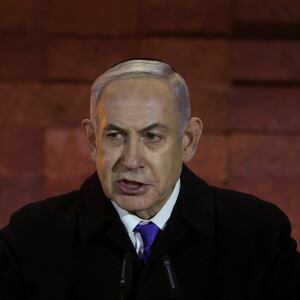Israeli tanks were spotted Tuesday in the center of Rafah for the first time, according to a report, after weeks of attacks on the city in southern Gaza where over a million displaced people had sought refuge from the war.
Witnesses told Reuters tanks and armored vehicles armed with machine guns and had been seen close to Al-Awda mosque, a notable landmark in the center of Rafah. The report comes the day after Israeli Prime Minister Benjamin Netanyahu said a “tragic mistake” had occurred in an airstrike on a camp for displaced people in the city over the weekend which, according to local health officials, killed at least 45 people.
Residents say tank fire and airstrikes continued in Rafah overnight even after the international condemnation of the tent camp fire Sunday which left dozens of Palestinians dead, Reuters reports. The news agency said the Israeli military confirmed only that its forces continued in the area of the city without specifically commenting on the claims of tanks in central Rafah.
Around 1.5 million people had been sheltering in the city before Israel launched ground operations in eastern areas of Rafah in early May, according to the BBC. Over the course of the past three weeks, roughly one million people have fled the city, the U.N. agency for Palestinian refugees (UNRWA) reported Tuesday, adding that providing assistance and protection is becoming “nearly impossible.”
After seizing the Palestinian side of the vital border crossing between Rafah and Egypt earlier this month, Israel’s tanks have reportedly advanced westwards in recent days. On Tuesday, the Israel Defense Forces said its troops had operated overnight in the Philadelphi Corridor—the strip of land separating Egypt and Gaza.
The operations came in response to “intelligence indicating the presence of terror targets in the area,” the IDF said, adding that “efforts are continuing to be made in order to prevent harm to uninvolved civilians in the area.”
The military action has continued seemingly unabated despite growing international pressure on Israel over the manner in which it is fighting its war against Hamas. President Joe Biden said earlier in May that he would stop supplying certain weapons to Israel “if they go into Rafah,” while the International Court of Justice last week ordered Israel to immediately halt its offensive in the city.
Netanyahu has consistently vowed to press on with the operations in Rafah, construing the city as being among the few remaining Hamas strongholds. He has promised to deliver a “total victory” over the group which led the Oct. 7 terror attacks in southern Israel and has seemingly been undeterred from achieving that goal despite the International Criminal Court’s top prosecutor seeking a warrant for his arrest in connection with alleged war crimes committed over the course of the conflict, which has now raged for almost eight months.
Netanyahu reiterated his intention to continue the war on Monday even amid the furious response to the weekend’s deadly fire in a camp for displaced Palestinians in Rafah. António Guterres, the U.N. secretary general, said he condemned “Israel’s actions which killed scores of innocent civilians who were only seeking shelter from this deadly conflict.” “There is no safe place in Gaza,” Guterres said Monday. “This horror must stop.”
Addressing the Israeli parliament Monday, Netanyahu stressed the importance of his military taking precautions to avoid harming civilians and said the camp attack would be investigated, according to the BBC. But he nevertheless reaffirmed his commitment to his objectives. “I don’t intend to end the war before every goal has been achieved,” he said.







